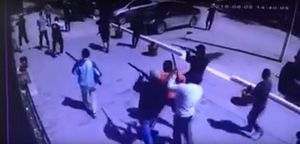Authorities in Aktobe have reported killed five suspected militants during a raid on an apartment where the men had reportedly holed up after the attacks last Sunday.
As the guests on Muhammad Tahir’s podcast for RFE/RL, Majilis, commented earlier this week, very few details are known about the attacks last weekend. The authorities had previously said six of the attackers remained at large. Subtract the five reportedly killed Friday and that leaves one–a dwindling number who can provide insight into the motivation of the Aktobe attacks. The authorities have reportedly taken several of the Sunday attackers into custody, but little has been said about their status or what explanations they have offered to the authorities.
Reuters dug into some of the names circulating in Kazakh media purporting to be the attackers. One of the names–Rustem Omarov–led to a VKontakte account with the same name that had shared a Russian-language ISIS promotional video at some point between April and June. At the least, this gives a clue to the attackers’ likely inspiration but doesn’t necessarily link them into the greater ISIS network in a direct way.
The Kazakh government’s narrative has calcified into a familiar form, arguing that the group was organized from abroad. With the death toll now at 25 (mostly the attackers themselves), the Aktobe attacks are the deadliest such incident in recent regional memory. President Nursultan Nazarbayev has doubled down on his accusation of foreign plotters, instructing his government during a meeting of his security council to increase monitoring of foreign funding of Kazakh organizations and citizens. He cited the United States, Israel and Germany as examples of countries that have legislation to ensure transparency in foreign funding–but as I’ve explained previously, in relation to the so-called foreign agents bill in neighboring Kyrgyzstan, the analogy isn’t quite that simple. If an external organization were bankrolling terrorists inside Kazakhstan, they wouldn’t be sending money via legitimate channels.
As Bruce Pannier notes in the podcast–this narrative doesn’t fit well with what evidence is available. “There doesn’t seem to have been much of a plan,” Pannier comments, pointing to the fact that they first act of the attackers was to rob a gun store. “So obviously they didn’t have weapons, they didn’t have money to buy weapons.” He also notes that many of the attackers–shown in this CCTV clip–were carrying shotguns. This is in contrast to terrorist attacks elsewhere, in which automatic weapons are the armament of choice for ISIS cells and ISIS sympathizers (example: Paris). The men are also not exactly dressed for a well-orchestrated terrorist-style attack: one is wearing an orange hoodie, another a baby-blue jacket.
The list of details we don’t know regarding the Aktobe attacks is extensive. How were these men organized? How did they know each other? Who (or what group) planned (badly, I’d say) their attack? Why did they attack when they did? What were their ultimate aims?
On that final question, Aigerim Toleukhanova, a correspondent for The Conway Bulletin and EurasiaNet, provides some insight in the podcast: “Even though they didn’t say anything, they showed with their actions. They attacked…official places, like military buildings, [so] they’re kind of attacking the government.”
Notably, the three civilians killed were a clerk, a security guard, and a customer at the gun stores (which have also been described as hunting stores, and perhaps less accurately as weapons depots). When the attackers commandeered a commuter bus, they off-loaded the passengers and the driver before ramming the gates at the military base. While no group has (believably) claimed responsibility for the attacks, the target choice and execution are indicative of a poorly-organized, poorly-funded operation sparked by anger at the state. There are clearly serious problems Kazakhstan needs to confront with regard to how its security apparatuses monitor and respond to violent attacks and domestic terrorism, but it looks more likely that the state will continue to put focus on external factors.
Highly recommended listening: RFE/RL Podcast: Lack Of Information Adds To Fears About Aktobe Violence
Clarification: This post was updated to clarify that some of the attackers have been reportedly taken into custody.

































